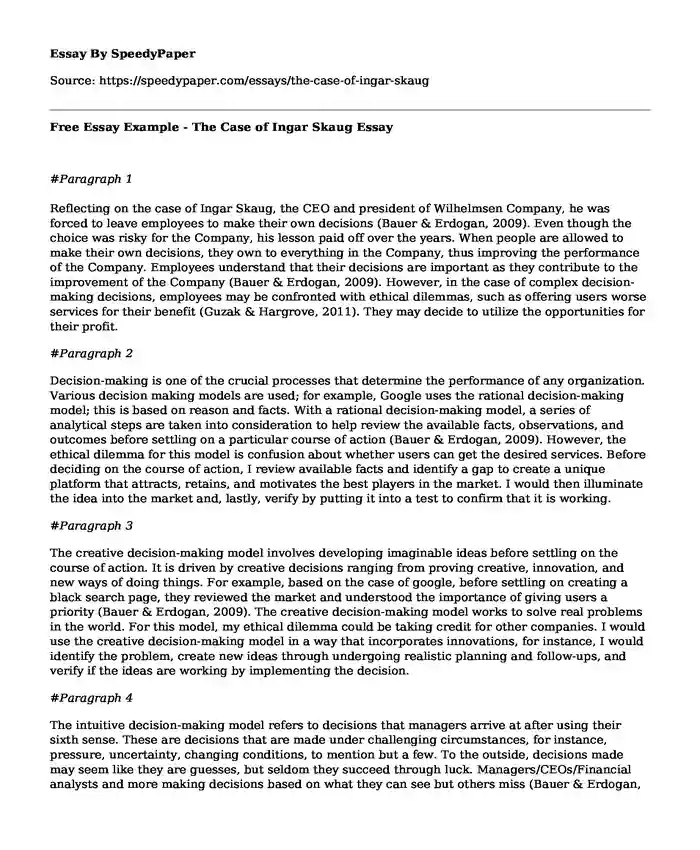
| Essay type: | Reflective essays |
| Categories: | Human resources Organizational behavior Leadership management |
| Pages: | 3 |
| Wordcount: | 607 words |
#Paragraph 1
Reflecting on the case of Ingar Skaug, the CEO and president of Wilhelmsen Company, he was forced to leave employees to make their own decisions (Bauer & Erdogan, 2009). Even though the choice was risky for the Company, his lesson paid off over the years. When people are allowed to make their own decisions, they own to everything in the Company, thus improving the performance of the Company. Employees understand that their decisions are important as they contribute to the improvement of the Company (Bauer & Erdogan, 2009). However, in the case of complex decision-making decisions, employees may be confronted with ethical dilemmas, such as offering users worse services for their benefit (Guzak & Hargrove, 2011). They may decide to utilize the opportunities for their profit.
#Paragraph 2
Decision-making is one of the crucial processes that determine the performance of any organization. Various decision making models are used; for example, Google uses the rational decision-making model; this is based on reason and facts. With a rational decision-making model, a series of analytical steps are taken into consideration to help review the available facts, observations, and outcomes before settling on a particular course of action (Bauer & Erdogan, 2009). However, the ethical dilemma for this model is confusion about whether users can get the desired services. Before deciding on the course of action, I review available facts and identify a gap to create a unique platform that attracts, retains, and motivates the best players in the market. I would then illuminate the idea into the market and, lastly, verify by putting it into a test to confirm that it is working.
#Paragraph 3
The creative decision-making model involves developing imaginable ideas before settling on the course of action. It is driven by creative decisions ranging from proving creative, innovation, and new ways of doing things. For example, based on the case of google, before settling on creating a black search page, they reviewed the market and understood the importance of giving users a priority (Bauer & Erdogan, 2009). The creative decision-making model works to solve real problems in the world. For this model, my ethical dilemma could be taking credit for other companies. I would use the creative decision-making model in a way that incorporates innovations, for instance, I would identify the problem, create new ideas through undergoing realistic planning and follow-ups, and verify if the ideas are working by implementing the decision.
#Paragraph 4
The intuitive decision-making model refers to decisions that managers arrive at after using their sixth sense. These are decisions that are made under challenging circumstances, for instance, pressure, uncertainty, changing conditions, to mention but a few. To the outside, decisions made may seem like they are guesses, but seldom they succeed through luck. Managers/CEOs/Financial analysts and more making decisions based on what they can see but others miss (Bauer & Erdogan, 2009). I would use an intuitive decision-making model on my ethical dilemma by choosing the right moral course of action. Although the decision might not be beneficial for all parties involved, I would use moral and core values to target the right decision that is acceptable in the broader community. Moreover, I would follow a pattern based on my prior experience to arrive at a potential course of action. I would also use my knowledge since I have ideas on how given solutions work and then finally test until I find a workable solution.
References
Bauer, T., & Erdogan, B. (2009). Organizational behavior (1st Ed.). New York: Flat World Knowledge.
Guzak, J. R., & Hargrove, M. B. (2011). The role of intuition in ethical decision making. Handbook of Intuition Research, 97.
Cite this page
Free Essay Example - The Case of Ingar Skaug. (2023, Sep 25). Retrieved from https://speedypaper.com/essays/the-case-of-ingar-skaug
Request Removal
If you are the original author of this essay and no longer wish to have it published on the SpeedyPaper website, please click below to request its removal:
- Free Essay with the Discussion on the URSCI Exposition
- Strategic Leadership, Change Management & Crisis Leadership Free Essay
- Free Essay. Sexual Deviance in the Society
- Essay Sample on Challenges in Correctional Management
- Essay Sample on Summary of Journal Article
- Free Essay Example: Inter-Professional Working
- Paper Example. Impacts of Automated Intelligence
Popular categories




